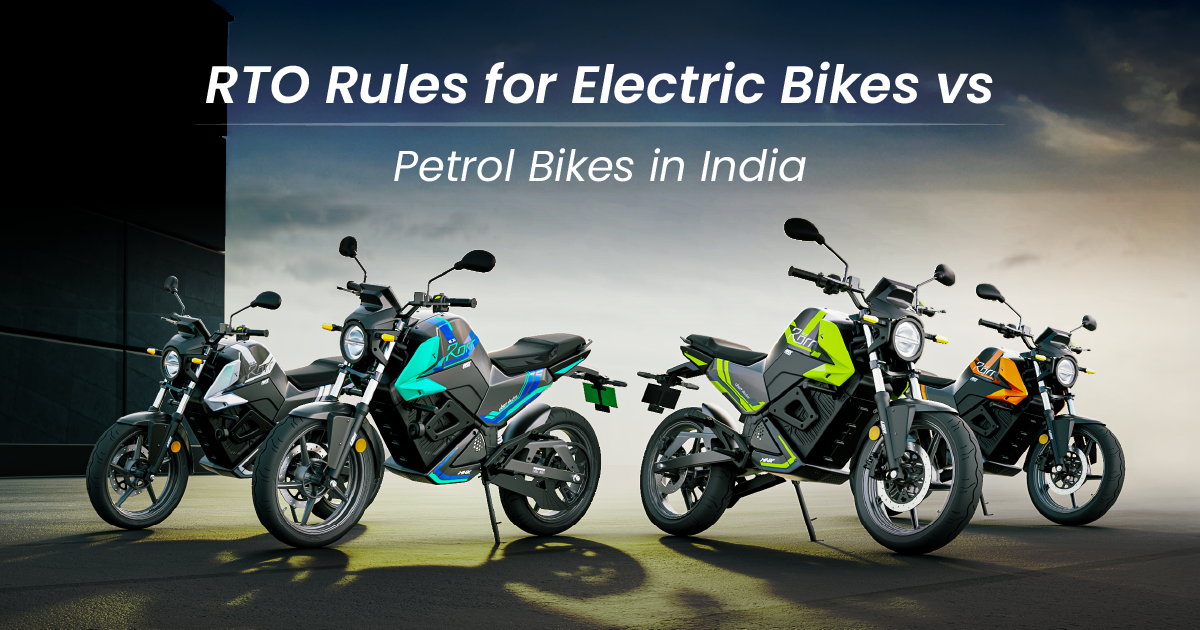- ALL
- TRENDING
- PERFORMANCE
- CHARGING
- BATTERY
- DESIGN
- TECH
- NEWS
RTO Rules for Electric Bikes vs Petrol Bikes in India: What You Need to Know

Table of Contents
- RTO Rules for Electric Bikes in India
- RTO Process: Electric vs Petrol Bikes
- Stay Ready with Oben Electric
- FAQs
Electric vehicles (EVs) are steadily gaining popularity in the Indian markets, with consumers increasingly recognising their long-term benefits. Much like their traditional petrol-powered counterparts, EVs are subject to certain rules laid down by the Regional Transport Office (RTO) of every Indian state. Oben Electric is dedicated to delivering innovative electric bikes that comply with regulations for a hassle-free transition to electric mobility.
Such RTO rules are in place to streamline the integration of EVs into existing traffic systems while ensuring safety for all commuters on the road. Since electric bikes and scooters follow a different set of regulations than traditional vehicles, it’s important to know the state-wise* RTO rules for electric bikes in India before making a purchase.
* State-wise RTO rules are subject to change depending on the respective state’s policies. Check the official website for the latest information.
RTO Rules for Electric Bikes in India
Whether you need a licence for an electric bike in India is determined by its speed and power output. Here’s a quick breakdown of the RTO rules for electric bikes in India, depending on the category:
Low-Speed EVs:
- Licence: Electric bikes and scooters with a top speed below 25 km/h and a motor power under 250W do not require a driving licence
- Registration: Low-speed EVs do not need RTO registration, owing to their limited speed and power. This means you can legally ride them without going through the standard registration process.
- Helmet: For some low-speed models, a helmet is not mandatory. However, remember that safety should always be a priority on the road.
- Insurance: Insurance is not mandatory.
- Age Limit: Some low-speed EVs have less strict requirements, starting at 16 years.
High-Speed EVs:
- Licence: If an electric bike or scooter exceeds 25 km/h or has a motor output above 250W, a valid driving licence is mandatory.
- Registration: High-speed electric bikes must be registered with the RTO. These vehicles are assigned a green number plate, highlighting their eco-friendly status.
- Helmet: Wearing a helmet is mandatory.
- Insurance: Insurance is mandatory.
- Age Limit: 18 years.
These rules play a vital role in ensuring safe, lawful, and regulated use of electric vehicles on Indian roads.
RTO Process: Electric vs Petrol Bikes
Below is a comparison chart highlighting the difference between the registration process of e-bikes and petrol bikes in India.
In addition to standard rules applicable to two-wheelers, certain state-wise RTO rules for bikes apply. Understand such rules and how you can legally drive your vehicle in your state by visiting their official portals:
Maharashtra - https://transport.maharashtra.gov.in/1035/Home
Karnataka - https://www.karnatakaone.gov.in/Info/Public/RTO
Tamil Nadu - https://tnsta.gov.in/
Delhi - https://transport.delhi.gov.in/
Stay Ready with Oben Electric
Electric vehicles are not just eco-friendly, they’re also easier to maintain and register compared to traditional petrol-powered bikes. With fewer moving parts, no engine oil changes, and simplified RTO processes (especially for low-speed models), EV ownership offers a hassle-free experience from day one. However, it is important to understand and follow RTO rules for electric bikes in India to enjoy a safe and hassle-free riding experience.
At Oben Electric, we’re committed to making your switch to electric seamless. Explore our range of electric bikes and ride into a greener future.
FAQs
Do I need a license for all EVs?
No, you only require a license for EVs with a top speed above 25 km/hr and a motor running capacity exceeding 250 W.
Is insurance mandatory for an electric motorbike?
Insurance is not mandatory for electric bikes having a top speed below 25 km/hr and an engine below 250 W.
Is RTO registration easier for EVs?
Many RTOs have a more streamlined and efficient procedure for owning EVs than for fuel-powered vehicles.




